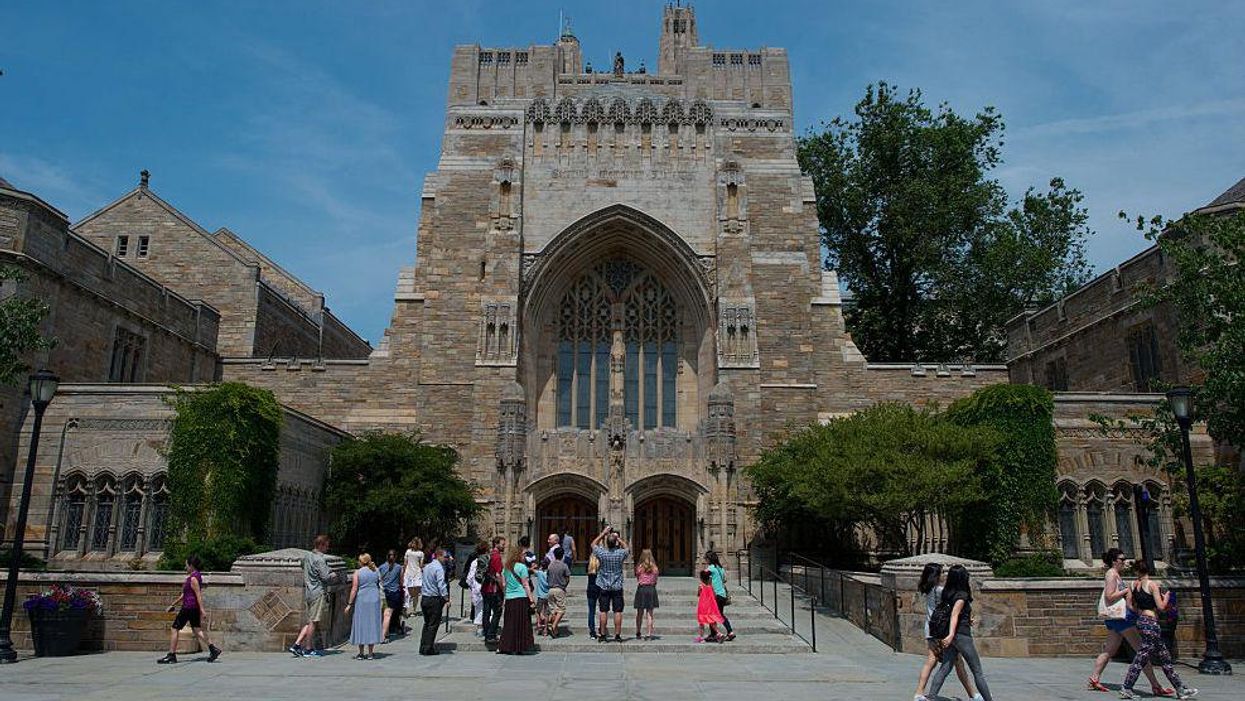
Craig Warga/Bloomberg via Getty Images

Trent Colbert, second-year student at Yale Law School, is refusing to apologize after his fellow students lodged allegations of racism at him over a party invitation.
On Sept. 15, Colbert — who is part Cherokee — sent an email to the Native American Law Students Association inviting the group to a party. The invitation email said:
Hope you're all still feeling social! This Friday at 7:30, we will be christening our very own (soon to be) world-renowned NALSA Trap House [redacted] by throwing a Constitution Day Bash in collaboration with FedSoc. Planned attractions include Popeye's chicken, basic-bitch-American-themed snacks (like apple pie, etc.), a cocktail station, assorted hard and soft beverages, and (most importantly) the opportunity to attend the NALSA Trap House's inaugural mixer!
Hope to see you all there!
According to the Washington Free Beacon, a screenshot of the email was immediately shared in an online forum for second-year law students. Some of Colbert's classmates claimed the invitation was racist. In fact, the president of the Black Law Students Association allegedly said, "I guess celebrating whiteness wasn't enough. ... Y'all had to upgrade to cosplay/black face."
The next day — after nine discrimination and harassment complaints were lodged — Colbert was summoned to meet with two school administrators: associate dean Ellen Cosgrove and diversity director Yaseen Eldik. Colbert recorded the meeting.
Eldik — who worked in the Obama administration, the Free Beacon noted — told Colbert the references in the invitation to "trap house" and fried chicken were "triggering associations." He was also told his membership in the Federalist Society was problematic.
After the meeting, Cosgrove and Eldik allegedly threatened to undermine Colbert's reputation and hurt his chances of passing the bar exam if he did not apologize. The administrators even drafted an apology letter on behalf of Colbert, but he declined to send it. When Colbert refused, the administrators sent a note to all second-year law students condemning the "pejorative and racist language."
"We condemn this in the strongest possible terms," the note read.
Responding to the controversy in an essay published Monday, Colbert explained that he is not against apologizing, but refused to do so in this situation — and has maintained his position — because he felt the situation did not warrant an apology.
"Not every instance where an apology is demanded is one where it is actually warranted," he wrote.
"After all, a fellow student wrote in our class forum that my failure to apologize was 'corny.' If I had interpreted the usage of 'corny' to be a sly reference to my indigenous background (corn is a Native American crop with immense cultural significance in indigenous communities), should that student be forced to apologize to me? I believe most people, including that student, would say no," Colbert continued.
"An action does not warrant a forced apology just because an individual or a group demands it," he wrote. "Instead, an apology should be a sincere expression of remorse and admission of fault."
The school responded to the controversy this month by claiming Yale Law School honors free speech.
"At no time was any disciplinary investigation launched or disciplinary action taken in this matter," the statement read, in part. "While any person may report concerns about a lawyers' character and fitness to the bar, the law school has a longstanding policy of reporting only formal disciplinary action to the Bar Association."
[twitter_embed https://twitter.com/davidlat/statuses/1448373149335236623 iframe_id="twitter-embed-1448373149335236623" created_ts="1634154042" name="David Lat" embed_mobile_width="375" text="8/ I just received the following statement from Yale Law School (@YaleLawSch), which emphasizes YLS's "strong free speech protections" and states that no investigation was initiated (unlike that @StanfordLaw situation a few months ago):pic.twitter.com/V9r1lxOAWC" embed_desktop_height="1209" embed_desktop_width="550" embed_mobile_height="1035" id="1448373149335236623" expand="1" screen_name="davidlat"]